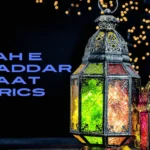The nasheed Wo Mera Nabi Hai is a profound poetic tribute celebrating the unparalleled status, virtues, and mercy of Prophet Muhammad (PBUH). Every verse of this composition reflects deep love and respect, offering a spiritual experience for listeners. Below, we provide the full lyrics and analyze each verse to uncover its rich meaning and significance.
| Dekhne Ko Ya Muhammad Naat Lyrics |
| Wo Shehre Mohabbat Jahan Mustafa Hai |
| Nawal Khan: A Rising Star in Islamic Naat |
| Darood e Taj: Powerful Verses You Need to Know |
Verse-by-Verse Analysis of Wo Mera Nabi Hai Lyrics
1. The Prophet’s Honor in Creation
“وہ جسکے لئے محفلِ کونین سجی ہے
فردوسِ باری جسکے وسیلے سے بنی ہے”
This verse highlights that the Prophet Muhammad (PBUH) is central to the universe’s creation. The term محفلِ کونین reflects how everything in existence celebrates him. It also signifies that Jannah was established as a reward for those who follow his teachings.
2. The Final Messenger and His Authority
“احمد ہے، محمد ہے، وہی خاتمِ رسول ہے
مخدوم و مربی ہے، وہی ولیِ کل ہے”
The Prophet Muhammad (PBUH) is acknowledged as خاتمِ رسول (the Seal of the Prophets), emphasizing his finality in the chain of messengers. His titles, احمد and محمد, represent his praiseworthy qualities. He is a guide (مربی) and caretaker (مخدوم) for all humanity.
3. The Light of His Face
“وہ شمسُ دہا چہرہِ انوار کی جلک ہے
واللیل سجا گیسوِ حضرت کی لٹک ہے”
This poetic imagery compares the Prophet’s (PBUH) luminous face to the sun (شمس), while his dark locks are likened to the beauty of the night (واللیل). This contrast represents his balanced personality, encompassing both mercy and majesty.
4. The Elevated Mention in the Quran
“اللہ کا فرمان “علم نشرح لک صدرک”
منسوب ہے جس سے “وَرَفَعْنَا لَکَ ذِکْرَک”
This verse references Quranic verses that underscore the Prophet’s (PBUH) elevated rank. Surah Ash-Sharh’s declaration (وَرَفَعْنَا لَکَ ذِکْرَک) confirms how Allah has exalted his name across time and places.
5. Reverence Through Divine Titles
“مزمّلو یسینو و مدّثِّر طہ
کیا کیا نئے القابوں سے مولا نے پکارا”
Allah honored the Prophet (PBUH) with unique titles like مزمل (the one wrapped in a cloak), یسین (a distinguished leader), and مدثر (the enwrapped). These titles illustrate his qualities and divine mission.
6. The Night Journey and Ascension
“وہ ذات کے جو مظہرِ لوح و قلم ہے
جو صاحبِ رفرف شبِ معراج ہوا ہے”
The Prophet (PBUH) is described as the essence of the Divine Tablet (لوح) and Pen (قلم), symbols of knowledge and destiny. The شبِ معراج (Night of Ascension) affirms his unparalleled spiritual journey where he led all Prophets in prayer.
7. Liberation of Women
“کس درجہ زمانے میں تھی مظلومیِ عورت
پھر جسکے بدولت ملی اِسے عزّتو رفعت”
This verse honors the Prophet’s (PBUH) revolutionary reforms for women. He uplifted their status, granting them dignity and rights in an era where they were oppressed.
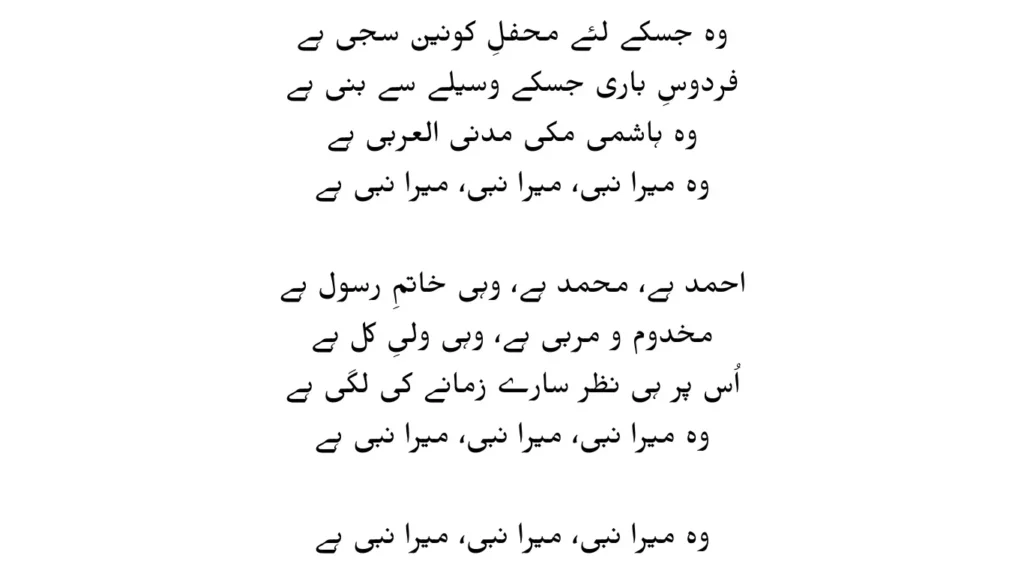
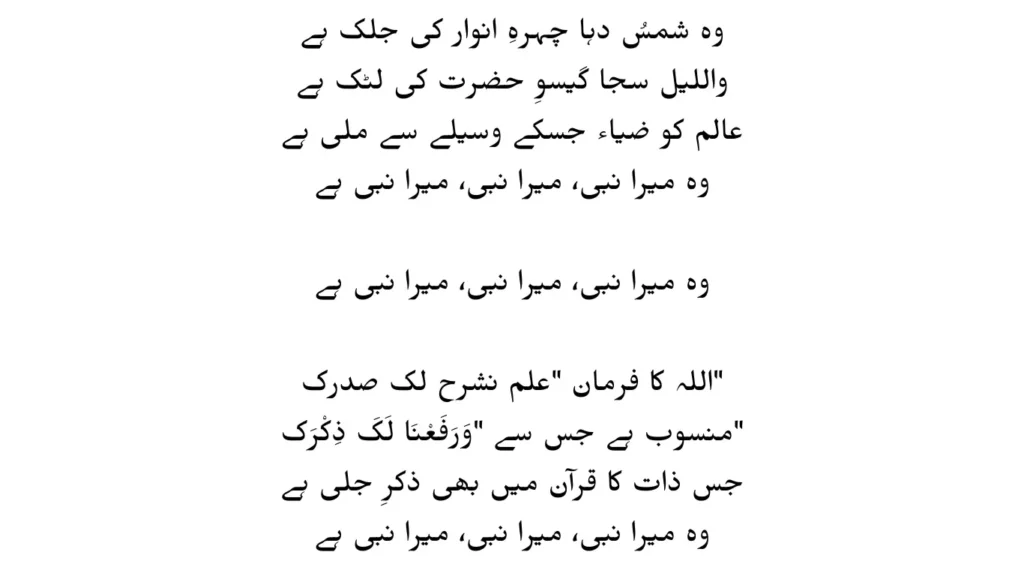
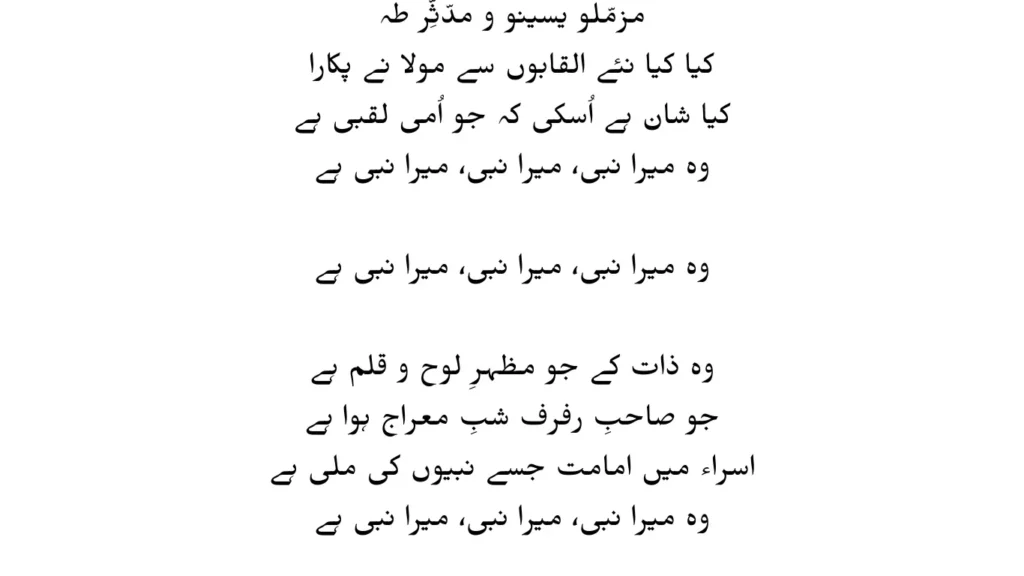
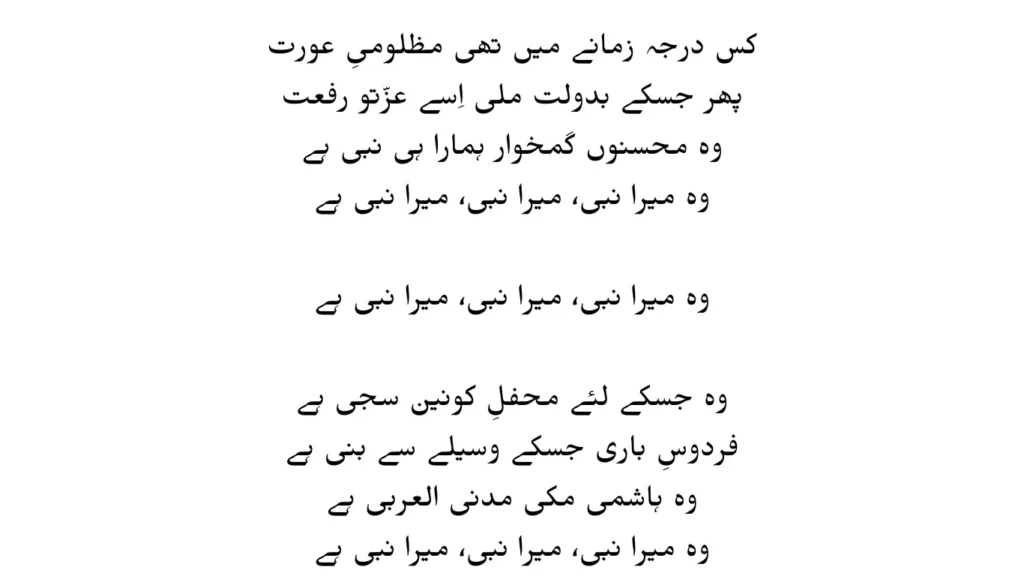
Significance of “Wo Mera Nabi Hai”
The nasheed encapsulates the essence of the Prophet’s (PBUH) life, mission, and mercy. It is not just a poetic work but a reminder of the profound impact he had on humanity. By reflecting on these lyrics, Muslims can deepen their love and connection to the Prophet Muhammad (PBUH).
FAQs:
The lyrics of “Wo Mera Nabi Hai” express deep love and reverence for the Prophet Muhammad (PBUH). Each verse highlights his unparalleled status, mercy, and contributions to humanity, making it a spiritually uplifting composition.
Key themes include the Prophet’s elevated status in creation, his luminous qualities, the liberation of women, and his divine titles as described in the Quran and Hadith.
The nasheed resonates with Muslims worldwide due to its poetic beauty, spiritual depth, and the way it celebrates the Prophet Muhammad’s (PBUH) virtues and contributions.


